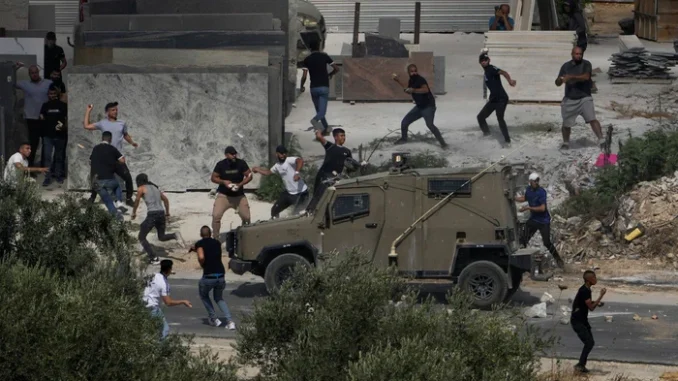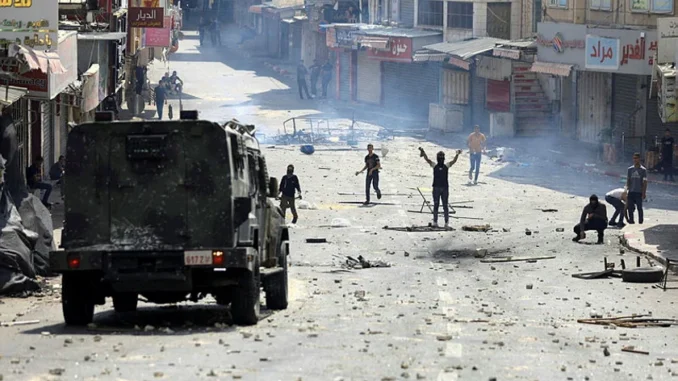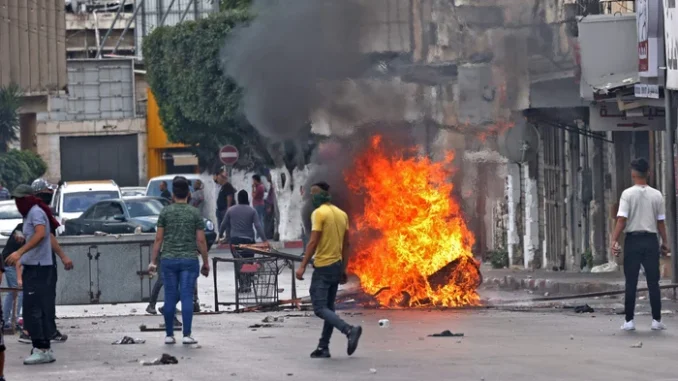The clashes showed that bolstering the PA isn’t merely an Israeli security interest, but above all a Palestinian interest. Palestinians don’t want a vacuum of governance; they want a functioning PA that will protect them and tend to civil affairs
By Jack Khoury, HAARETZ
Palestinian demonstrators protesting the arrest of two Palestinian militants clash with Palestinian security forces, in Nablus in the Israeli-occupied West Bank on Tuesday.Credit: MOHAMAD TOROKMAN/ Reuters
Early Wednesday morning, representatives of armed Palestinian groups in Nablus and the Palestinian security services reached agreements to return the city to normal in the wake of the clashes that erupted in the West Bank following the Palestinian Authority’s arrest of Hamas operatives wanted by Israel. Soon after, the municipal teams began cleaning the streets where the clashes broke out, including the main square. The city center, which yesterday looked like a battlefield after residents burned tires, threw stones and vandalized public property, returned to a kind of routine. But the city’s residents are now left with a sobering taste of what could happen if the Palestinian Authority loses its control over the West Bank.
The security services promised not to arrest people wanted by Israel unless they are suspected of breaking Palestinian law. The armed groups promised not to flaunt their power in Nablus and to restrict their activities to the town’s Old City. Both sides agreed to negotiate over the fate of one of the Hamas operatives arrested Tuesday, Musab Ashtaya, but no date was set for his release. Finally, everyone arrested during Tuesday’s clashes will be released unless they deliberately vandalized public property or exploited the unrest to steal.
Residents in Nablus clash with Palestinian security forces, turning the city center into a battlefield.Credit: Ronaldo Schemidt / AFP
“The agreed conditions show that the Palestinian Authority and its security services have managed to impose order on the city and set limits even on the armed groups,” a senior PA official said.
One Nablus resident was killed and two were wounded during Tuesday’s clashes. Protesters burned tires and threw stones at the security services, and guns were fired in the city’s main square. Armed men took to the streets in both Nablus and Jenin and warned the security services against cooperating with Israel, and in Jenin, someone shot at the governor’s mansion.
Nablus residents were furious at the young people who exploited the clashes to break store windows or vandalize banks. In some cases, people were seen leaving stores with looted meat.
“This is no longer a protest or a demonstration; it’s vandalism,” a veteran member of one militia said. “Someone fighting for the release of a freedom fighter doesn’t do damage like that.
“We’re in a paradoxical situation,” he added. “We began the day protesting against the PA and ended it demanding that the PA impose order.”

Palestinians hurl rocks at Israeli military vehicles during an Israeli military operation in the West Bank village of Rujib, last week.Credit: Majdi Mohammed /AP
The residents’ anger and photos of the vandalism and theft persuaded the militias to accept the agreement ending the clashes. Nablus Governor Ibrahim Ramadan, who controls the PA security services in the city, made a personal appeal to militiamen during the predawn negotiations.
“I don’t hate you, on the contrary – your blood is Palestinian blood and must not be spilled in vain,” he said, adding that he had never seen anything like Tuesday’s clashes before, “and it’s completely unacceptable.”
Ramallah decides
One senior PA official said the decision not to free Ashtaya came from the Palestinian government in Ramallah. “Ashtaya was detained for security reasons, and he can’t be released just because someone decided to protest,” he explained. This decision was supported by the PA’s security services and intelligence agencies.
This official insisted that contrary to Israel’s fears, the Nablus clashes don’t show that the PA is on the verge of collapse or losing control. In fact, several PA officials said, the clashes were a strength test that the PA passed. To this end, it had decided to deploy large numbers of police officers in and around the city if order wasn’t restored within hours.
Mazen al-Bandak, a Fatah activist in Nablus, said the militias’ protest was legitimate, but restoring order was more important.
“Every Palestinian understands that weapons used to oppose the occupation are legitimate weapons, and therefore the protest and the understandings that armed men won’t be pursued are justified,” he explained. “Nevertheless, the Palestinian public needs personal security and quiet. A city like Nablus can’t be out of control. The city is more important than any wanted man.”
Senior Fatah officials rejected claims that the clashes were effectively between the Fatah-controlled PA and the main opposition groups, Hamas and Palestinians Islamic Jihad.
“Neither organization has the infrastructure to lead a large protest,” one said. “They rode the protest wave and tried to sow chaos. Many in the city realized this, especially merchants and business owners, and a decision was therefore made to end the riots immediately.”
The clashes showed that bolstering the PA isn’t merely an Israeli security interest, but above all a Palestinian interest. Palestinians don’t want a vacuum of governance; they want a functioning PA that will protect them and tend to civil affairs.
A senior Fatah official in Nablus said the clashes rang alarm bells in Ramallah and in the West Bank’s influential business sector. “One question that arose was who would impose order in the West Bank if there were a loss of security control – for instance, if Palestinian President Mahmoud Abbas weren’t functioning,” he said.
One Nablus merchant said the clashes were a worrying glimpse of what could happen throughout the West Bank if the PA did lose control. “A vacuum and an absence of governance could lead to the rise of militias, and it would be impossible to know who’s behind them or what their agenda is,” he warned.





Leave a Reply
You must be logged in to post a comment.